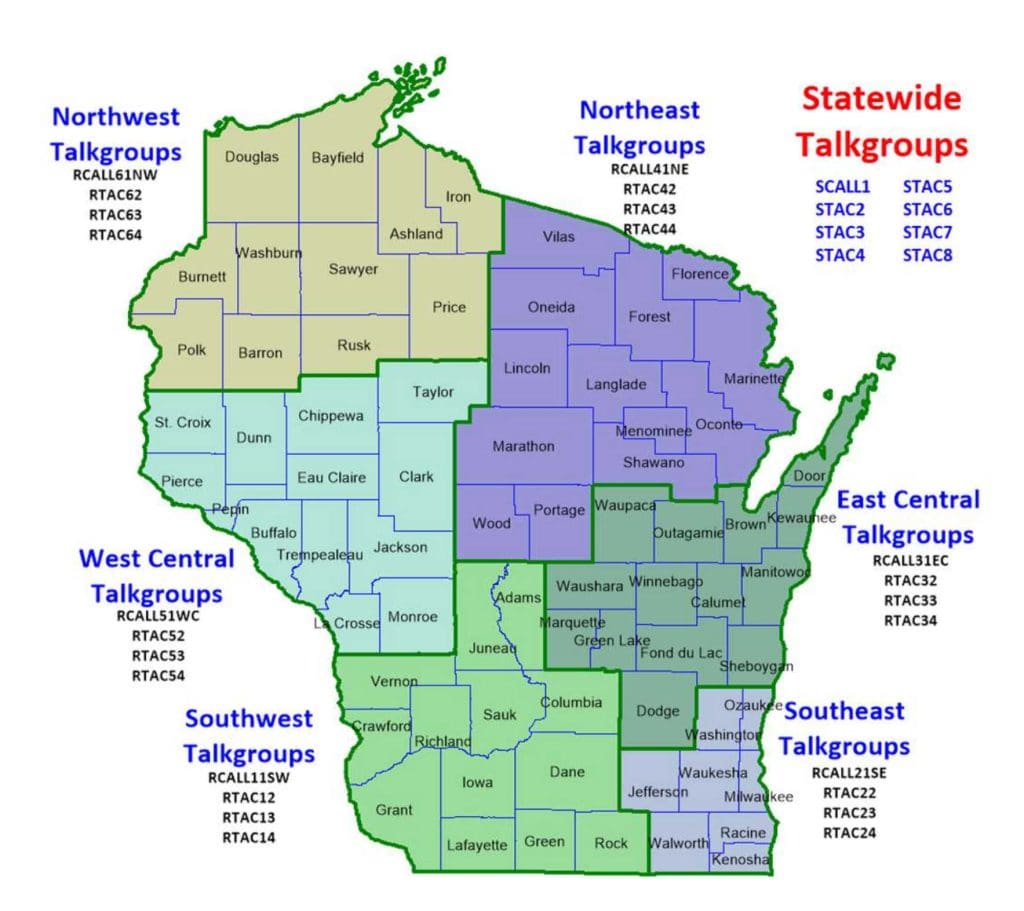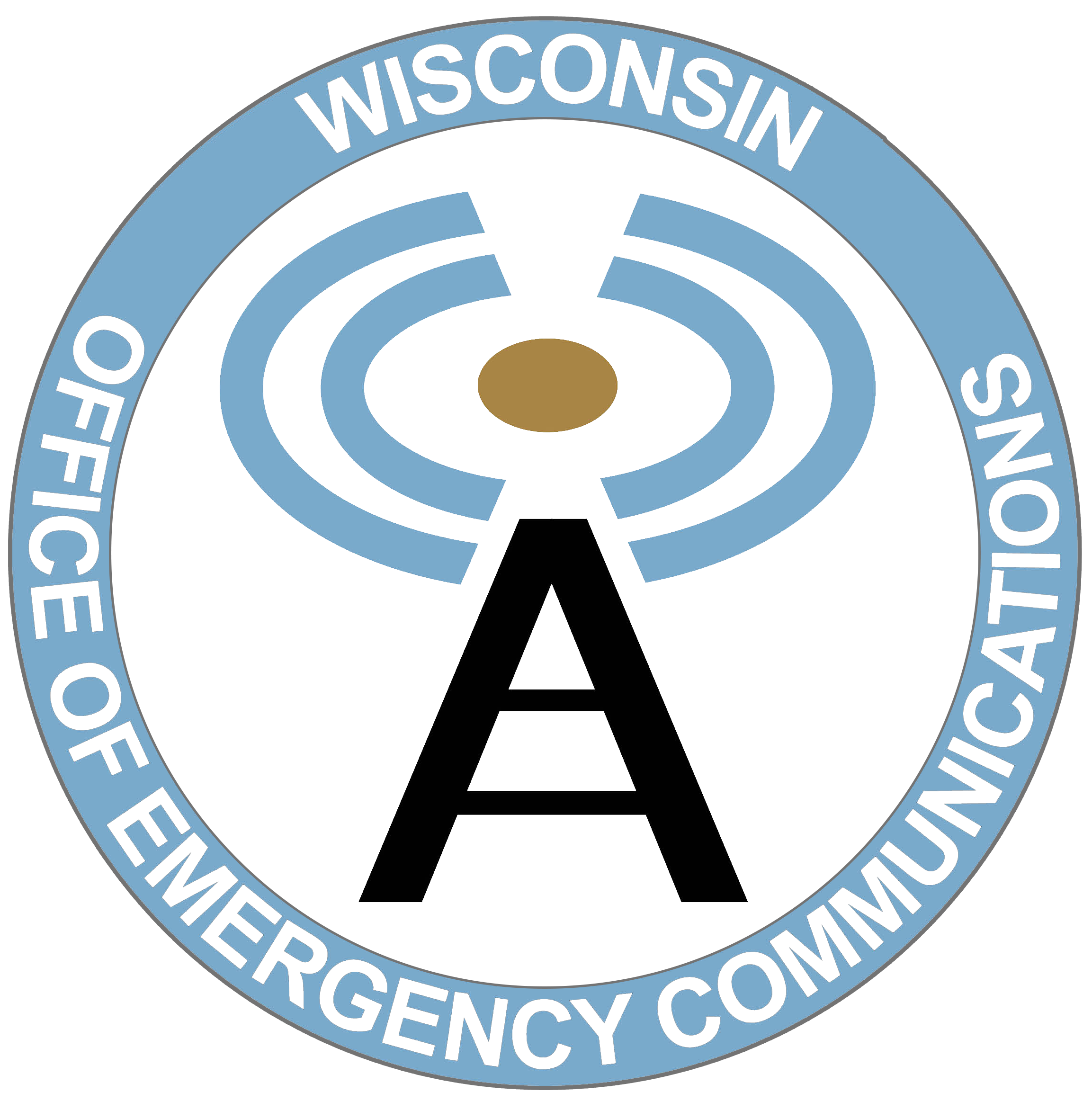Type: Procedure
Subject: Use of the Regional and Statewide Interoperability Talkgroups
Effective: May 4, 2015
Content
- Overview
- Plain Language and Unit Identification Requirements
- Regional Interoperability Talkgroups
- Statewide Interoperability Talkgroups
- Training
- Map
Overview
The Wisconsin Interoperable System for Communications (WISCOM) is a statewide digital trunked public safety radio system that is available for use by all disciplines. WISCOM enables users to communicate with multiple public safety agencies to engage in routine interoperable communications and coordinate their mutual aid and multi-discipline incident response efforts on a shared communications system utilizing both regional and statewide interoperability talkgroups.
WISCOM is built on a VHF backbone; however there are several areas that also offer 800 MHz coverage in addition to VHF.
Plain Language and Unit Identification Requirements
Plain Language – All interoperable communications during multi-agency, multi-discipline incidents will be in plain language. Radio codes, acronyms, and abbreviations should not be used as they may cause confusion between agencies. All verbal requests for assistance or backup must state the reason for the request.
Unit Identification – Field units will announce their home agency and unit number, during interoperable communication situations, (e.g. “Superior Engine 1”). Specialized unit “type” may also be included if appropriate to the incident or event.
Any station/unit conducting a radio test on a WISCOM talkgroup shall use the following language to avoid any confusion by those monitoring the talkgroup:
“Radio test on [name of talkgroup]. [Agency/Unit Number or radio service] clear”. SPECIAL NOTE: Radio testing is not permitted on SCALL1.
Regional Interoperability Talkgroups
There are six separate interoperability regions on WISCOM that match the Wisconsin Emergency Management (WEM) regions. A map that shows the interoperability regions is included with this procedure.
Each region has been assigned one “calling” talkgroup and three “tactical” talkgroups. The following table shows the talkgroup assignments with the radio display regional identifier suffix. Note that the regional suffix is NOT used during voice transmissions.
Southwest (SW)
- RCALL11SW
- RTAC12SW
- RTAC13SW
- RTAC14SW
Southeast (SE)
- RCALL21SE
- RTAC22SE
- RTAC23SE
- RTAC24SE
East Central (EC)
- RCALL31EC
- RTAC32EC
- RTAC33EC
- RTAC34EC
Northeast (NE)
- RCALL41NE
- RTAC42NE
- RTAC43NE
- RTAC44NE
West Central (WC)
- RCALL51WC
- RTAC52WC
- RTAC53WC
- RTAC54WC
Northwest (NW)
- RCALL61NW
- RTAC62NW
- RTAC63NW
- RTAC64NW
Use of the RCALLx1 Talkgroup
- RCALLx1 is the designated public safety regional calling and high priority radio traffic talkgroup on WISCOM. It is the initial contact point for all communications in each region.
- RCALLx1 communications are broadcast region-wide and will be heard on any mobile, portable or base radio monitoring/scanning this talkgroup.
- RCALLx1 should be used as the default communication center-to-communication center pathway to transmit assistance requests such as vehicle pursuits, injury accidents, officer(s) requesting aid or assistance, bank alarms, robbery in process or other typical emergency radio traffic.
- Based upon the type of console system used by the dispatch center, high priority incidents being transmitted on RCALLx1 may also be patched/simulcast over the center’s primary channels or talkgroups.
- As a regional “calling” talkgroup, all communications centers need to closely monitor RCALLx1 for transmissions from all public safety field personnel who are requesting assistance from a specific county communications center.
- Since RCALLx1 is a calling and high priority radio traffic talkgroup, once it is determined that extended interoperable communications is required, all involved agencies will be directed to move to a specific RTACxx talkgroup. The dispatch center for the agency with incident command shall be responsible for migration to the RTACxx talkgroup and will use the following format for the announcement:
“Attention all units responding to [incident/location], switch to RTACxx for all traffic related to this incident, authority [Agency with incident command], via [lead communications center name if different from the authority]”.
Inter-Region Communications Using an RCALLx1 Talkgroup
Public safety agencies have the ability to contact another public safety agency located in a different interoperability region by switching to the RCALLx1 talkgroup assigned to the region where the agency is located.
Example:
An Iowa County Sheriff’s Office squad, (Southwest Interoperability Region – SW) traveling through the East Central Interoperability Region (EC) would be able to contact the Kewaunee County Sheriff’s Dispatch Center by calling them on RCALL31.
RCALLx1 Roll Call and Testing
In order to promote the active usage and monitoring of RCALLx1 the various regional interoperability coordinators (RICs) will assist with the initial establishment of periodic roll calls within their respective regions. Recommended guidelines for conducting a roll call include:
- The roll calls are generally scheduled at pre-determined times and should be conducted on all shifts. As awareness of the use of the RCALLx1 increases, random, unannounced testing may be implemented.
- Each region will determine who will conduct the roll call. Options include:
- All roll calls are conducted by a specific communications center
- Roll calls are rotated among the various communications centers in the region.
- Roll calls are initially conducted by the regional interoperability coordinator and then transferred to a communications center.
- The roll call should begin with the following announcement:
“This is the [name of communications center] conducting a roll call on RCALLx1. All stations stand-by to acknowledge”. - All communications centers should be polled alphabetically and will acknowledge by responding:
“[Name of agency] copy” - The polling communications center will respond with:
“[Polling communications center], copies (agency polled)” - Any agency that does not respond during the first round will be called a second time.
“Re-calling [Name of agency center]” - After polling the region’s standard list of agencies , next ask:
“Any agencies monitoring RCALLx1 that were not named during this roll call please identify yourself.” - The next step is to ask:
“Any field units or apparatus monitoring RCALLx1, please identify yourself.” - The test should end with the announcement:
“This concludes the roll call of RCALLx1, [name of communications center/RIC] clear”. - The regional interoperability coordinator should be notified by the agency that conducted the roll call of any radio communication technical or non-monitoring issues that occurred. The regional interoperability coordinator will make any necessary contacts to resolve the issue.
Use of the RTACxx Talkgroups
The RTACxx talkgroups are intended for routine interoperable communications, mutual aid incidents or planned events. Since each region has a limited number of tactical talkgroups, they will be assigned as follows:
- Incidents will be assigned in the order beginning with RTACx2, then RTACx3, and finally RTACx4 if available.
- If an incident increases to span multiple interoperability regions, incident command and communications unit leaders (COMLs) should consider migrating from the RTACxx talkgroups to the STACx talkgroups.
- Planned Events will be assigned in the order beginning with RTACx4, then RTACx3. A planned event will not be assigned to RTACx2. The incident command agency will notify all WISCOM capable agencies within in the region of planned use of the talkgroup prior to the event via a TIME System message or other appropriate method. WISCOM representatives shall also be notified of the planned event usage via email at WISCOMtech@dot.wi.gov to monitor system resources and avoid any talkgroup assignment conflicts.
- If the nature or scale of the incident or event requires additional talkgroups, then the statewide tactical talkgroups should be utilized.
- Upon completion of the incident or event, the lead communications center shall instruct all involved units to switch to their primary talkgroup (or channel) and resume normal operations. The lead communications center will also announce on RCALLx1 that RTACxx is available for use.
Statewide Interoperability Talkgroups
WISCOM currently has one “calling” talkgroup and seven “tactical” talkgroups that are available for use in any region of the state. They are:
SCALL1
STAC2
STAC3
STAC4
STAC5
STAC6
STAC7
STAC8
Use of the SCALL1 Talkgroup
- SCALL1 is the statewide mutual aid calling channel. Any transmission made on SCALL1 will be broadcast on every WISCOM radio tower and will be heard on any base, mobile or portable radio that is monitoring/scanning this talkgroup in the state.
- SCALL1 is available for use for communications center-to-communications center transmission between the various six interoperability regions for requests such as vehicle pursuits, injury accidents, officer(s) requesting aid or assistance, bank alarms, robbery in process or other typical emergency radio traffic.
- SCALL1 is available for use by field users traveling outside of their region; however, field units should always use the region’s RCALLx1 if available in their mobile or portable radio.
CAUTIONARY NOTE: SCALL1 may not be actively monitored by some communications centers as some centers are unable to monitor more than the default regional calling talkgroup.
Use of the STAC Talkgroups
- The STACx talkgroups are available for routine interoperable communications, mutual aid incidents or planned events.
- The STACx talkgroups can be utilized for communications between field units that are physically located in different regions of the state; when the local RTACxx are not available or the when the nature or the scale of the incident or event dictates their use.
- Incidents will be assigned in the order beginning with STAC2, then STAC3, and so forth.
- Planned Events will be assigned in the order beginning with STAC8, then STAC7 and so forth. A planned event will not be assigned to STAC2, STAC3 or STAC4. The incident command agency will notify all WISCOM capable agencies within in the region of planned use of the talkgroup prior to the event via a TIME System message or other appropriate method. WISCOM representatives shall also be notified of the planned event usage via email at WISCOMtech@dot.wi.gov to monitor system resources and avoid any talkgroup assignment conflicts.
- Upon completion of the incident or event, the lead communications center shall instruct all involved units to switch to their primary talkgroup (or channel) and resume normal operations.
Training
All personnel using the WISCOM radio system are required to receive training. The current training policies and standard instructional information is available from the Wisconsin Interoperability Initiative website, http://www.interop.wi.gov/ and then selecting the WISCOM tab.
Map


